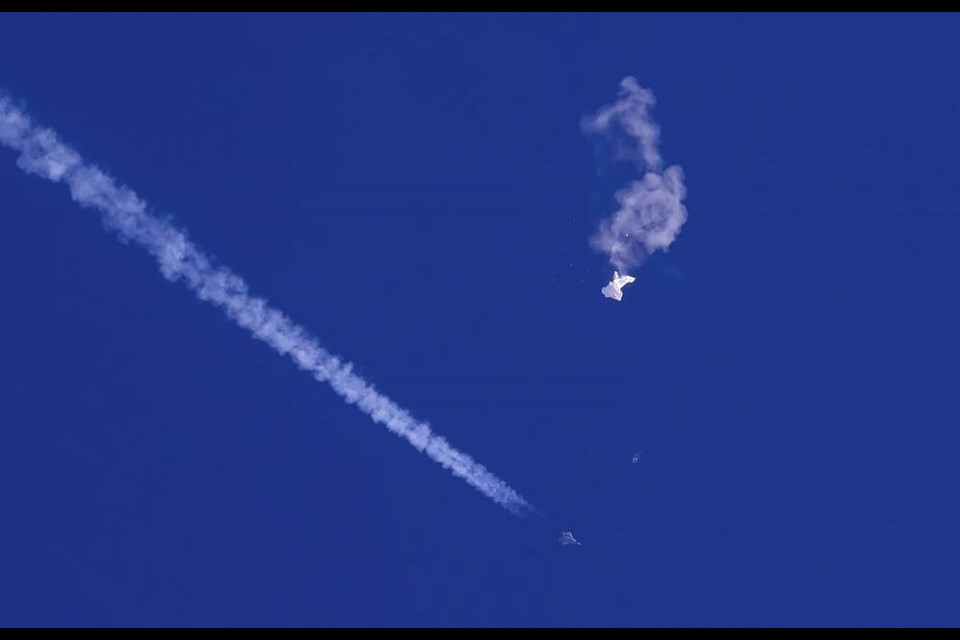It’s too early to speculate on the security threat posed by the latest objects to be shot down by the U.S military over North America, says a UBC specialist in international security.
Allen Sens said the unidentified cylindrical object downed over central Yukon on Saturday and a flying object at high altitude shot down near the Canadian border over Lake Huron on Sunday mostly add to the larger increase in tension, distrust and confrontation between China and the U.S., Canada and other Asia-Pacific countries.
On Sunday, Prime Minister Justin Trudeau said he ordered the object over central Yukon shot down because it posed a threat to civilian aircraft and potentially to Canadians. He added that Canada and the U.S. are taking the situation “extremely seriously.”
It was the first of the four objects shot down over North America this month to be destroyed over Canadian territory.
There isn’t yet any verification of what was shot down, said Sens, who has a particular interest in armed conflict and conflict management.
Military officials have referred to the Yukon object as a balloon.
“They do appear to be balloons or small dirigibles of some kind, but whether they are connected to the first balloon incident is unclear at this point,” Sens said. “We have to be cautious. We cannot assume that the objects shot down recently were necessarily intelligence gathering balloons from China.”
A suspected Chinese spy balloon was shot down off the coast of North Carolina on Feb. 5 and, on Friday, the U.S. military shot down an object described as being the size of a small car over Alaska.
Trudeau said Norad — the North American Aerospace Defence Command — spotted the next object over Northern Canada Saturday afternoon and he made the order to have it shot down.
Separately, Air Canada said in a government aviation incident report that on Jan. 31, during a flight from Vancouver to Winnipeg, there was a “large balloon about 4,000 feet above them with something hanging from it.”
At the time, the plane was flying at an altitude of 35,000 feet (10,000 metres) about 120 kilometres from Cranbrook in southeastern B.C. The disclosure, which was published on Feb. 9 by Transport Canada, said that Norad was advised.
Sens said that balloons used for intelligence-gathering purposes do not pose much of a direct threat.
“Their primary purpose is to gather information about military communications and radar frequencies and military installations,” he explained.
“China’s use of these balloons is not particularly surprising, but should the more recent incidents be confirmed as the interception of more Chinese intelligence-gathering balloons, it will raise questions about whether the use of these balloons is increasing and will indicate a disturbing escalation in China’s willingness to directly provoke the U.S. by sending these craft over its territory.
“That in and of itself is a concern, and while the initial U.S. reaction to the first balloon was cautious, the recent interception and downing of these other objects indicates the limits of patience both in the U.S. and Canada, and therefore the potential for an incident to spiral into a crisis.”
Sens said all of this fits into a larger pattern of increased aggressiveness by China, which includes its military pilots taking greater risks in flying close to allied aircraft in the eastern Pacific and its vessels showing more aggressiveness in territorial disputes in the South China Sea.
He also said China’s “clumsy response to the discovery and interdiction of the first balloon demonstrates that they were unprepared for the political crisis that would unfold if such a balloon was discovered, or thought it could be easily dismissed.”
Sens said that the incidents will reinforce the significance and value of Norad, which is “the cornerstone of Canada-U.S. defence co-operation in North America. Norad has already been more active, countering increased Russian military activity in the air over the arctic, so now there is even more to do when it comes to the security of the air approaches to North America.”
Trudeau left for Whitehorse on Sunday morning on a trip planned before the object was destroyed, but his meeting will now include discussions with leaders there about the incident.
— With a file from The Canadian Press





